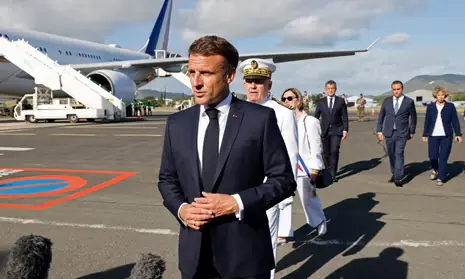President Macron Alarmed by Unrest, Prioritizes Return to Peace and Security
President Emmanuel Macron of France made a swift and urgent visit to New Caledonia on Thursday, signaling deep concern over the escalating violence that has gripped the Pacific territory in recent days.
Macron’s unexpected journey, spanning over 16,000 kilometers, underscores the gravity of the situation as New Caledonia grapples with its most severe bout of unrest since the 1980s.
Upon his arrival at La Tontouta International Airport, located approximately 50 kilometers from the capital, Noumea, Macron expressed his foremost priority: “My wish, along with that of my ministers and the government, is to be alongside the people and see a return to peace, calm, and security as soon as possible.”
The president’s decision to personally intervene led him to discard his previously arranged schedule, reflecting the urgency with which he views the crisis unfolding in the territory.
The recent wave of violence, characterized by shootings, arson, looting, and loss of life, has claimed at least six lives and inflicted widespread damage, prompting Macron to take immediate action.
Macron’s lightning visit, slated to last just one day, allows him to witness firsthand the aftermath of the unrest and engage with local leaders bitterly divided over the issue of independence.
Amidst fears that proposed amendments to the French Constitution could exacerbate tensions by favoring pro-France politicians, Macron seeks to foster dialogue and reconciliation among opposing factions.
The violence erupted on May 13, coinciding with debates in the French legislature in Paris regarding changes to New Caledonia’s voter lists. Critics of the proposed measures argue that they could further marginalize the Kanaks, a group that has historically endured segregation and discrimination within the territory.
Decades of unresolved tensions between the indigenous Kanaks and descendants of colonists have underscored the complex social and political landscape of New Caledonia, home to approximately 270,000 people.
While some advocate for independence, others staunchly support maintaining ties with France, leading to a protracted struggle for self-determination.
In response to the crisis, Macron’s administration has deployed over 1,000 additional security forces and declared a state of emergency to restore order.
Despite these efforts, unrest persists, posing a formidable challenge to Macron’s objective of quelling the violence and initiating a process of reconciliation.
During his visit, Macron is expected to engage in discussions aimed at facilitating dialogue among local leaders and addressing the urgent need for reconstruction efforts.
The extent of the damage wrought by the violence is estimated to be in the hundreds of millions of euros, underscoring the magnitude of the task ahead.
Macron’s past efforts to mediate between pro-independence and pro-France factions culminated in a 2018 referendum, in which New Caledonians narrowly voted to remain part of France.
However, the recent outbreak of violence highlights the fragility of the territory’s political stability and the unresolved grievances that continue to fuel unrest.
As Macron convenes with stakeholders and surveys the devastation wrought by recent events, the eyes of both New Caledonians and the international community remain fixed on the outcome of his visit.
In a region fraught with historical tensions and competing aspirations, Macron’s leadership will be tested in his quest to restore peace and security to this troubled territory.
This article was created using automation and was thoroughly edited and fact-checked by one of our staff editorial members



